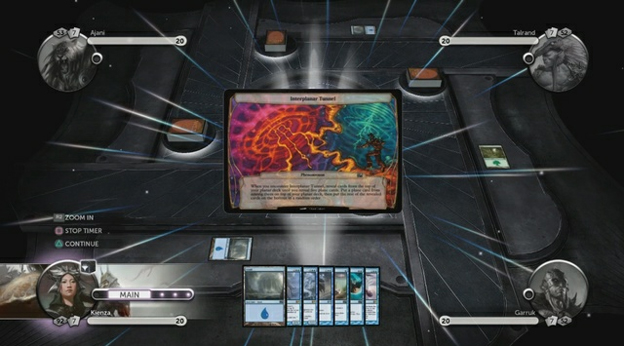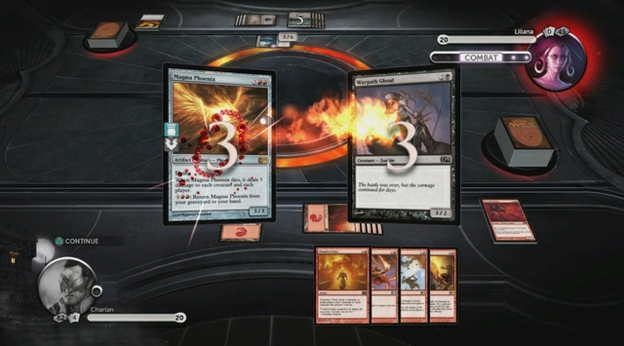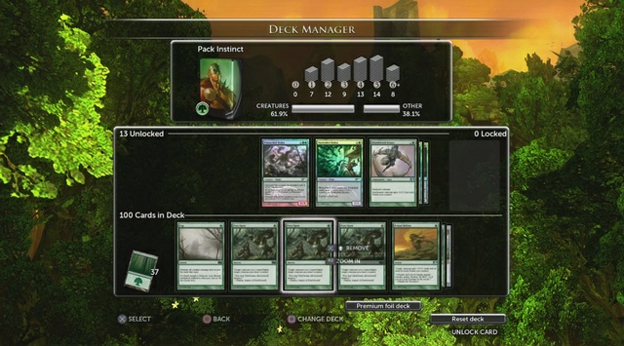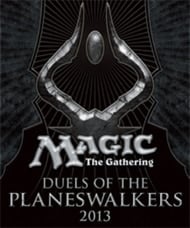Revenge Of The Nerds
Like most young(ish) nerds, I have fond memories of playing Magic: The Gathering in middle school. A few friends and I would get together in someone’s basement, munch on salty snacks, summon monsters, and send them into epic battles.
Those days are far behind me—save for my ongoing love of potato chips—but somewhat amazingly, Magic soldiers on, delighting today’s preadolescent dweebs (and many adult dweebs as well) with its easy-to-learn, hard-to-master mechanics and awesome drawings of scary creatures. And, as it turns out, the brand even has a video game spinoff, Duels of the Planeswalkers, that recently received its third yearly edition, labeled 2013.

You might think that a Magic video game would be some kind of RTS or RPG—a game that starts with the Magic characters and battle system, adapts them, and takes advantage of the added realism that video games can depict. But no: This is nothing more than the card game in digital form. Planeswalkers 2013 has a few advantages and disadvantages relative to the paper version, as well as a few tweaks relative to the 2012 game. All told, it will be a decent buy for Magic enthusiasts who prefer to play digitally, but it has little to recommend itself to anyone else.
If you haven’t played Magic in a long time, or ever, here’s a quick primer on how it works in its physical incarnation. Magic cards are divided into several different categories; there are land resources (for example, swamps and mountains), creatures, and assorted effects and artifacts. There is an astonishing variety of cards; you can buy the specific cards you want, though the rare ones are incredibly expensive, or you can buy packs that contain a random assortment. Once you’ve acquired a good set of cards, you use them to build decks that suit your strategy.

At the beginning of a match, all players draw seven cards; typically, a hand will have some lands, some creatures, and maybe an effect or two. During each turn, a player can draw a card, place a land on the table, and “tap” his lands for mana, a resource he uses to summon creatures and perform other spells. There’s also a combat phase, in which a player can send his creatures to attack his rivals, who in turn can use their creatures to block. Each creature has an attack strength, as well as HP—when a creature’s HP is lower than his opponent’s attack strength, he dies. If an attacking creature goes unblocked, he deals damage directly to the opposing player. Each player has 20 HP and dies when it runs out. Creatures’ HP, but not players’, resets at the end of each turn.
Add several more layers of complexity—for example, if a creature has the “trample” ability and deals more damage than a blocking creature can absorb, the excess damage goes to the enemy player—and you have Magic. Because you start with a different hand each game, every match forces you to carefully consider the best way to combine your lands, creatures, and buffs into devastating attacks while fending off your opponents. And depending on the size of your group, you can arrange players in all sorts of configurations to mix things up even more—1v1, 2v2, free-for-all, etc.

Planeswalkers 2013 works almost exactly the same way, with some fantasy music and a hint system added. The biggest difference is that one of the more annoying aspects of Magic—the fact that the quality of your deck depends largely on how much money you’re willing to blow on unusually good cards—is gone. Instead, you start with a modest collection of pre-made decks, and you unlock more cards and decks as you progress through the campaign. You can’t build decks from scratch, but you can modify the premade decks with the cards you unlock. And there are tons of cards to unlock, so you’ll have considerable leeway (and lots of matches to play before you’ve unlocked them all).
The level playing field is a welcome development, and the premade decks will be great for people who would rather actually play than fiddle around with different combinations of cards. Another major advantage of the digital game is that you never have to wait for your friends to come over and play—the Internet offers a steady supply of human opponents, and there’s a single-player campaign against the A.I. (with multiple difficulty levels) that you can try. In addition, there are challenges that put you into bad situations and force you to play your way out, a task that often requires exploiting the finer points of Magic’s rules, as well as “encounters” that pit you against opponents who use bizarre strategies.
There are also some tweaks to the 2012 version that fans will enjoy. While the basic interface is almost exactly the same, you can now choose what lands to tap yourself. (Most spells require you to tap at least one of a certain type of land, but you can get the rest of the required mana from any land you want. Previous versions of the game chose these lands for you, leading to the possibility that the game would tap lands you need for other spells.) The ten premade decks are also new and cater to a wide variety of strategies. While I never played the 2012 game, others say the multiplayer runs more smoothly than it used to.
Finally, there’s a ridiculous new mode, Planechase, a free-for-all four-person match in which an unmanned deck of cards unleashes “Planes,” or random global effects that wreak havoc on the game.

That’s all to the good, but it’s not to say that Magic players will be leaving the card stores in droves. Planeswalkers 2013 lacks a lot of what the paper game provides. Some of this is inherent to the medium of video games—for example, the basic conversation and camaraderie that accompanies a card game goes missing when the game is online. (We nerds don’t get out much, so we need all the social interaction we can get.) Also, the game is constantly pausing for a few seconds to let you look at new cards that have been played and make decisions about how to respond—which is often necessary, but also interrupts the more natural flow of the paper game.
Some of the design decisions are kind of obnoxious, though. For example, the game seems to pause more than it needs to when there’s absolutely nothing you can do in response to your opponent’s cards. It seems that a better system would allow the A.I. to make these moves instantaneously and simply provide you with a summary. The animations are also longer than they need to be. And despite the fact that the entire game consists of showing you simple images of cards with some text and animations, there are loading times between matches. Overall, the gameplay feels much, much slower than it needs to. With other card games (like hearts and poker), the digital world offers speedy games to make up for the lack of social interaction. Planeswalkers 2013 fails to take advantage of this possibility.
Basically, Duels of the Planeswalkers 2013 does an acceptable job of bringing Magic into the world of video games and upgrading the 2012 version. However, there are enough hiccups in the implementation that most Magic fans will prefer to stick with the paper product—and those of us who no longer play Magic aren’t missing anything by skipping it.
RATING OUT OF 5 RATING DESCRIPTION 3.0 Graphics
All the game does is show you cards and animations, but there are still loading times. 4.5 Control
Select card. Push button. 4.3 Music / Sound FX / Voice Acting
The fantasy music works with the game. 3.5 Play Value
It’s just a card game, but it’s basically well-designed. 3.5 Overall Rating – Good
Not an average. See Rating legend below for a final score breakdown.
| Review Rating Legend | |||
|---|---|---|---|
| 0.1 – 1.9 = Avoid | 2.5 – 2.9 = Average | 3.5 – 3.9 = Good | 4.5 – 4.9 = Must Buy |
| 2.0 – 2.4 = Poor | 3.0 – 3.4 = Fair | 4.0 – 4.4 = Great | 5.0 = The Best |
Game Features:
